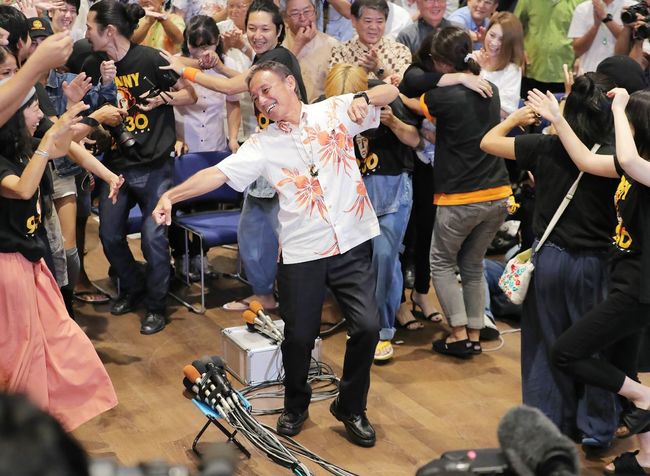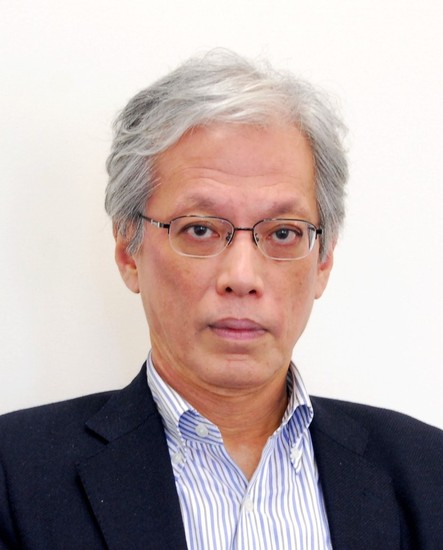 |
|
Denny Tamaki does a traditional dance in the Okinawan capital of Naha after winning Okinawa’s gubernatorial election against a candidate backed by the Abe administration on Sept. 30.
|
Key issue among Okinawans is Abe administration’s push to build US naval base on island
In September, elections were held in Japan for the leader of the Liberal Democratic Party (LDP) and governor of Okinawa Prefecture. In the LDP election, the incumbent leader – Prime Minister Shinzo Abe – beat his challenger, former secretary-general Shigeru Ishiba (37-73), by a sizable margin in the parliamentary vote, but won by a narrow margin of 55-45 in the vote among regular party members. The result makes it more apparent than ever that discontent with Abe runs deep even among LDP supporters. The Okinawa gubernatorial election – essentially a two-horse race between one candidate backed by the ruling party and another backed by the opposition – ended with a lopsided win for the opposition candidate, former House of Representatives member Denny Tamaki. (The candidates in the Okinawa race were Tamaki, backed by the Constitutional Democratic Party and Communist Party, and former Ginowan Mayor Atsushi Sakima, backed by the LDP and Komeito Party.) One of the big issues in the Okinawa election concerned the Abe administration’s push to build a US naval base at Henoko in the city of Nago. The race ended with a win for Tamaki, who has opposed the construction. The results made it clear that Okinawans are quite disgruntled with the Abe administration’s high-handed approach. In the LDP election, Abe’s term was extended by another three years, guaranteeing it until Sept. 2021. His administration is also set to continue for three years, provided the LDP does not lose in the House of Representatives election. But Abe now faces serious problems for his political strategy with his struggle in the LDP leadership race and the loss of the Okinawa gubernatorial election. If he wins another three-year term as Prime Minister, Abe will head the longest-serving administration in modern Japanese history. His big dream is to have the Constitution amended during his term. But even his own party is not settled on the idea of pursuing an amendment. During the LDP election, Ishiba criticized Abe’s amendment attempts as “sloppy” and said the issue would require a national consensus. Within the ruling coalition, the Komeito joined the LDP in throwing its full-scale support behind the ruling party candidate in the Okinawa election – but the call for support was not heeded by Okinawa residents, who are strongly committed to peace. The result was a major blow for the Komeito. Exit polls showed 30 percent of Komeito supporters in Okinawa Prefecture voted for the opposition-backed candidate. As a result, the Komeito has been conspicuously unenthusiastic in its attitude on amending Article 9 of the Constitution (in which Japan renounces the right of belligerency and the possession of armed forces). On Oct. 2, Abe announced a Cabinet reshuffling and LDP appointments. The new Cabinet is almost unprecedented in its right-wing makeup. Many of those appointed are historical revisionists who have made remarks denying the existence of military comfort women or the Nanking massacre (1937) or reactionaries who extol the virtues of the Imperial Rescript on Education, a symbol of the militaristic education practices of the past. The only female Cabinet member, regional revitalization minister Satsuki Katayama, has been at the forefront of those repudiating the idea of “naturally endowed human rights” and attacking livelihood protection recipients. Abe deliberately brought into his Cabinet someone who does not understand the basic values of modern politics – things like citizen sovereignty and the dignity of the individual. Rather than winning the support of moderate Japanese, his aim seems to be to keep his administration going by solidifying support among his core of right-wing conservatives. It’s an approach that could very well have adverse consequences on the foreign policy efforts the Abe administration prides itself so much on. In the future, the administration looks to establish closer ties to China and resolve the issues of normalization of relations and the abduction of Japanese nationals with North Korea.
 |
|
Yamaguchi Jiro, professor of political science at Tokyo‘s Hosei University
|






